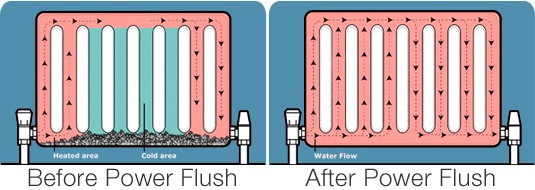Before talking about weather or not your system needs a flush you need to understand what the ‘sludge’ is. The ‘sludge’ is a form of rust. When you combine different metals, water and oxygen you get rust. There is one particular type of heating system that is more prone to sludge and that is the more traditional open vented system, which is the system with a water tank (feed and expansion tank) in the loft or high up in an airing cupboard. The reason these systems are more prone to the buildup of ‘sludge’ or rust is because oxygen can get into the system through the feed and expansion tank. If this system had a small leak in it say on a radiator valve or on a pipe or on a radiator the rust build up would accelerate. The reason being fresh oxygenated water would be fed into the system from the feed and expansion tank and combined with the metals in the system would cause more rust or ‘sludge’.
If however you do not have a feed and expansion tank (sealed systems) but you are having to top up the water pressure in your central heating system regularly then this will also accelerate the production of rust. Regular loss of water pressure in a sealed system does mean there is a fault somewhere in the system and should be investigated as soon as possible to avoid bigger repair bill if not addressed.
In order to prevent the rusting to occur in the 1st place a central heating inhibitor / protector should be added to the central heating water. These solutions do expire over a certain amount of time depending on which brand you use so this should also be checked during any heating system service.
Now onto the question of ‘do I need a flush?’ One of the easy ways to tell if your system has a build up of sludge and therefore inefficiently would be to feel your radiators after the heating has been on for 20 – 30 mins. If the bottom middle is significantly colder than the top middle of the radiator then that means there is something blocking the radiator and that something will be sludge. The downstairs radiators are more likely to be the worst affected by any sludge build up.

Another symptom would be a noisy boiler when the boiler is reaching temperature, noisy or failed heating pump.
Keep it Clean
After you have had a central heating flush it’s a good idea to fit a central heating filter on the system to protect the system by collecting any rust that occurs throughout the year. then during the boiler service the central heating filter can be cleaned and it can indicate whether or not the system requires more inhibitor or not.
Flushing a central heating system usually takes between half a day and full day to complete depending on the size of the system and the amount of sludge in the system.
If however you are looking to change your boiler building regulations and boiler manufacturers state a the central heating system must be flushed before the boiler installation is complete. If the system is not flushed the warranty on your boiler is usually void. There has been talks of adding central heating filters to the building regulations because of their benefits.
